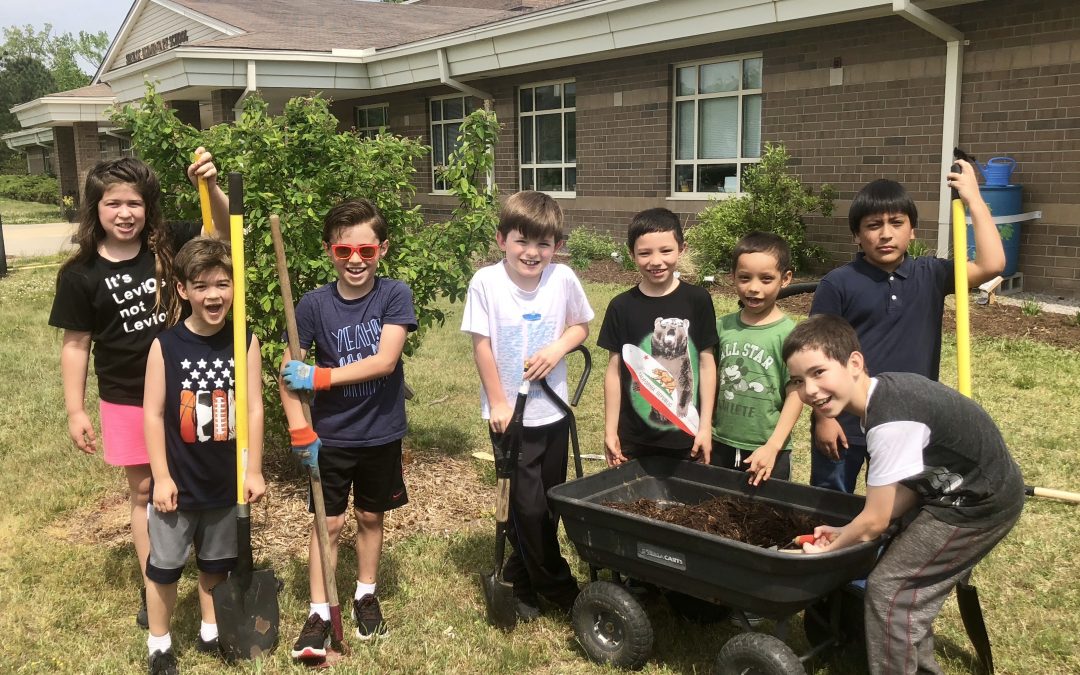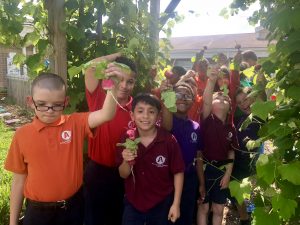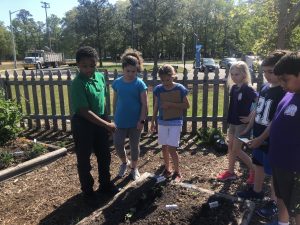By. Marie T. Culver, Teacher at Seatack Elementary School, Virginia Beach City Public Schools
“I have learned so much about the environment and have discovered that my own skills are unlimited.”
Austin Davis, fifth-grader at Seatack Elementary School
Seatack Elementary School, a Title I school and An Achievable Dream Academy, is located in an area of Virginia Beach, Virginia where many of our 385 students have limited access to nature and green spaces. That’s one of the reasons why our school’s gardens are so special. We have designed and planted a variety of gardens to promote scientific literacy in our students, as well as serve as a source of food for our school community. Our gardens include a Certified Wildlife Habitat courtyard garden, butterfly garden, Ocean Friendly Garden, and community vegetable garden. All of them are showcases for sustainability and models for learning gardens throughout Virginia Beach City Public Schools, promoting a sense of school and community pride through improving our natural habitat while increasing students’ understanding of living things on earth.
Seatack’s gardens focus on the essential question, “How do we empower children and adults to live sustainably to positively affect the world?” One way the gardens are helping us answer this question is by serving as living laboratories, allowing students to learn from and explore human relationships with nature. In these “laboratories,” students are honing the skills they need to be successful problem-solvers and leaders of their own learning. Exploration, patterns, systems, structures, relationships, and change are concepts that march through the garden with integrated curriculum. Kindergarteners and first-graders measure plants using unifix cubes for nonstandard measurement and add their findings to a data chart. Second-graders are in the midst of creating a pollinator garden using recycled tires to promote terraced farming, tying in with their study of Ancient China. Third-graders recently researched crops that were planted in Ancient Greece to create a healthy garden based on their findings. Fourth- and fifth-graders are creating their own scientific investigations, collecting weekly qualitative and quantitative data.
When students aren’t learning in the gardens they are busy helping to maintain them. Everyone, from Kindergarten through fifth-grade, plays an active role in the gardens, sowing seeds, nurturing plants, collaborating with community members, harvesting and preparing garden produce to eat, and composting any waste that remains. Organic gardening practices are utilized to plant herbs, vegetables, edible landscaping, and native plants and trees to increase pollination. Students can be found problem solving which plants to choose during each growing season and comparing/contrasting plant species for the individual raised beds. Fruits and vegetables such as blueberries, strawberries, and sugar peas are observed throughout the seasons to understand their cycles and are enjoyed at the end of the school year. Since Seatack has a summer intercession, students can enjoy the garden produce in the summer months too. Kindergarteners are often heard squealing with delight while harvesting their own radishes and lettuce after planting, measuring, and collecting data. Vegetables and herbs that are grown in the gardens are shared with our school family and community to encourage them to make healthy choices.
Through maintaining our gardens, students are learning important life lessons too. For the past five years, ten fifth-grade boys with diverse cognitive, affective, and social needs have been selected to be a part of our Garden Breakfast Club. These students are often dealing with things like anger management issues, truancy, ADHD, low self-esteem, homelessness, health issues, learning English as a second language, and/or having an incarcerated parent. We started the Garden Breakfast Club to teach about acceptance and celebrate each other’s diversity. Life skills of perseverance, growth mindsets, decision making, independence, integrity, teamwork, and problem solving are learned, just by working in and tending to the gardens. Boys of all cultures and races can seen running out into the gardens smiling, eager to work, learn, and grow together. As a result of participating in the Garden Breakfast Club, these students have improved attendance, earned higher test scores, and gained life coping skills. Notes fifth-grader Liam Wheeler, “I’m a lot happier now that I am able to work in the garden daily while interacting with other people and helping my school and community.” Their work in the gardens doesn’t stop with the end of school either. During the hot days of summer, many of the students come by weekly to maintain our gardens and to harvest fresh food for their own families. The boys even return to work in the gardens after moving on to middle and high school.
Taking pride in maintaining Seatack’s gardens extends beyond the four walls of the school and into the community. During a recent Cinco de Mayo Spruce Up the Garden Day, community members from the entire city came together to learn about gardening and teamwork. After a four-hour Saturday work session in the Ocean Friendly Garden a second-grader who came with his pre-school sister, mother, and father for the first time pleaded very loudly, “Can we come back and work in our garden next Saturday?” Bryce Farthing, an eighth-grade alum who attends every summer garden session and community garden day reflected, “The garden we have grown, in a way, represents those who have worked together to raise it from the seedlings they once were. We have created something not only beautiful but that works together in harmony as the community does.”
In addition to caring for our gardens, students love to visit and share their knowledge with all who will listen. In fact, it’s not uncommon to find our students serving as garden docents to other Virginia Beach City Public Schools. Students cherish this role, which, in turn, cultivates in them a sense of environmental stewardship and confidence, and teaches them to be leaders in their community. Recently, 125 students, teachers, and parents from Old Donation School came to visit for a garden field experience. Their “instructors” were our student garden docents and participants returned to their own schools with the knowledge they needed to build learning gardens of their own.
Our school gardens have taught us a lot over the last few years. They play a role in developing a school culture committed to the principles of sustainable living through individual and collective action. They allow us to go beyond raising awareness that “green is good” to embrace action learning and integration with curriculum. And they teach our students to become environmentally literate citizens who are prepared to create a sustainable world for future generations.
Perhaps the question one should ask is this: “Why wouldn’t we start a garden?” Ready, set, grow together with your students. They will show you the way.
Marie T. Culver is a gifted resource teacher at Seatack Elementary School, An Achievable Dream Academy, in Virginia Beach, Virginia. She has taught at Virginia Beach City Public Schools for the past 30 years. In 2016, Marie received the Elizabeth Abernathy Hull Award, presented by the Garden Club of America, for furthering environmental education and inspiring children to appreciate the beauty and fragility of our planet.



